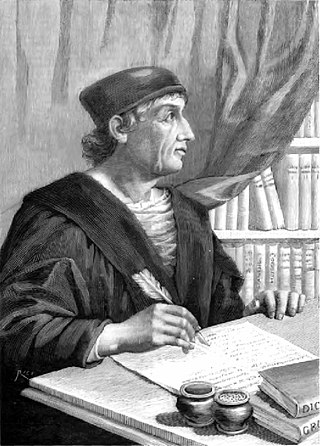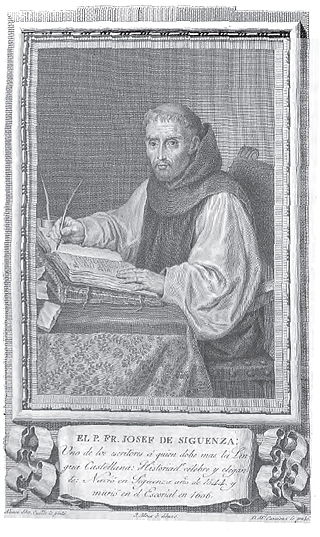October 8 is the 281st day of the year in the Gregorian calendar; 84 days remain until the end of the year.

Antonio de Guevara was a Spanish bishop and author. In 1527 he was named royal chronicler to Charles V, Holy Roman Emperor. His first book Libro áureo first appeared in pirated editions the following year. This pseudo-historical book of incidents and letters from the life of Marcus Aurelius was translated into nearly every language of Europe, including Russian, Swedish, Hungarian, Polish, Armenian, and Romanian. The popularity of Guevara’s book led scholar and translator Méric Casaubon to remark that no book besides the Bible was so often translated as Guevara’s Relox de principes, or Dial of Princes. Besides his book of Marcus Aurelius, Guevara wrote eight other books, some of which continued to be translated and republished in the seventeenth and eighteenth centuries.

Antonio de Nebrija was the most influential Spanish humanist of his era. He wrote poetry, commented on literary works, and encouraged the study of classical languages and literature, but his most important contributions were in the fields of grammar and lexicography. Nebrija was the author of the Spanish Grammar and the first dictionary of the Spanish language (1495). His grammar is the first published grammar study of any modern European language. His chief works were published and republished many times during and after his life and his scholarship had a great influence for more than a century, both in Spain and in the expanding Spanish Empire.

José de Sigüenza was a monk of the Order of Saint Jerome, historian, poet, and theologian. He was the prior of the monastery of El Escorial, where he served as both librarian and historian.
Eloísa Gómez-Lucena is a Spanish contemporary writer.
Ángel Martínez Casado and died in Virgen del Camino, León Province, Spain, 03/04/2024) was a Dominican friar and PhD in History and Theology. He received humanistic and religious education at La Virgen del Camino College, from where he entered the novitiate in the Dominican Order in October 1965, in Palencia. He began his religious studies in Las Caldas de Besaya (Santander) and Salamanca, where he made solemn religious profession in 1973.
Federico Martínez Roda is a professor of history at the Valencia Catholic University.

Eloy Anselmo Luis y André was a Spanish psychologist, philosopher, educator and Galician writer.
Alkartu was a publication issued from Mexico City in 1942-1947. The periodical was published by the Communist Party of Euskadi. It was published in Spanish language. Luis Zapirain was the director of Alkartu. Secundino Ortega was the editor of Alkartu. The office of Alkartu was located at Morelos, 77-3. The party also published an edition of Alkartu in Toulouse, France.

Milícia Catalana was a Spanish nationalist and Catholic armed group that operated between 1986 and the mid 90s in Catalonia, Spain. Founded on 24 August 1985, the group was formed by Catholic priests affiliated with the Parroquia de San Félix Africano, who espoused the integralist teachings of Marcel Lefebvre, alongside notable figures from the Hermandad Sacerdotal Española. The emergence of this group is due to the parallel emergence in Spain of other violent right-wing groups that attacked the democratic opposition and the growing independentist and/or socialist movements. The political wing of Milícia Catalana was the Catalan Patriotic Movement (MPC).

Francisco Darío Villanueva Prieto is a Spanish literary theorist and critic. He has been a member of the Royal Spanish Academy since 2007, and he occupies the chair corresponding to the letter D. Secretary of the Academy from December 2009, he was elected director in 2014, post he held until January 2019.
The so-called Geneva Manifesto is a term referring to the declarations made by Infante Juan, Count of Barcelona in the Swiss newspaper Journal de Genève published on 11 November 1942, in which he called for the formal restoration of the Spanish monarchy with him as King, as he was Alfonso XIII's legitimate heir. King Alfonso died a year earlier.

Ismael Crespo Martínez is a political scientist and expert in Latin America, Professor of Political science at the University of Murcia, Spain, and director of the Department of Political Science and Administration at the same university. In addition, he runs MásPoderLocalArchived 2017-03-01 at the Wayback Machine, a digital magazine on political communication and electoral behavior focused on Spain and Latin America. Since 2012, he is the president of the Latin American Association of Electoral Campaign Researchers.
María Rosa de Gálvez or María Rosa Gálvez de Cabrera, was a Spanish poet and playwright during the Age of Enlightenment and Neoclassicism periods.

María Victoria Moreno Márquez was a Spanish writer and teacher. She was one of the pioneers of literature for children and young people in Galician. The Day of Galician Literature was devoted to her on 17 May 2018.

The Stabilization Plan of 1959 or the National Plan of Economic Stabilization were a series of economic measures taken by the Spanish Government in 1959. Its main goal was the economic liberalization of the Spanish markets, marking a turning point from the previous policies oriented towards achieving autarky.
Adela Galiana y Albaladejo, also known as Adela Galiana de Osterman was a Spanish writer, playwright, poet and columnist.

Gregorio Prieto Muñoz was a Spanish painter associated with the Generation of '27.

Francisco Rodríguez Marín was a Spanish poet, paremiologist, and lexicologist.










